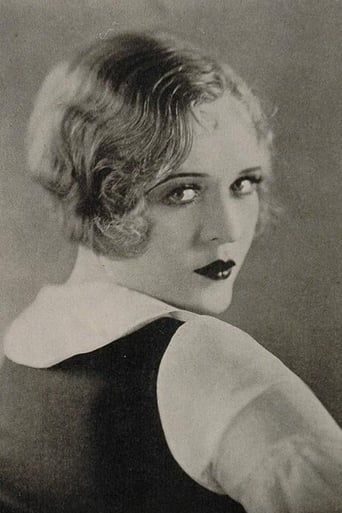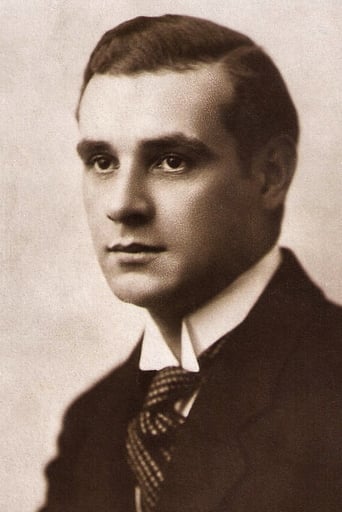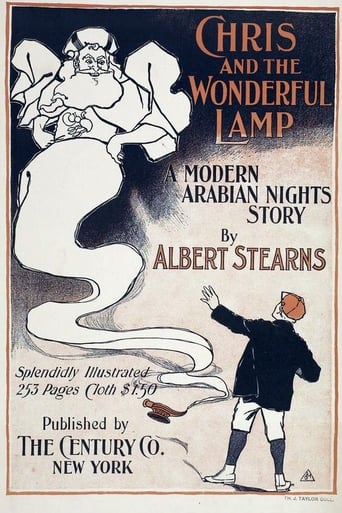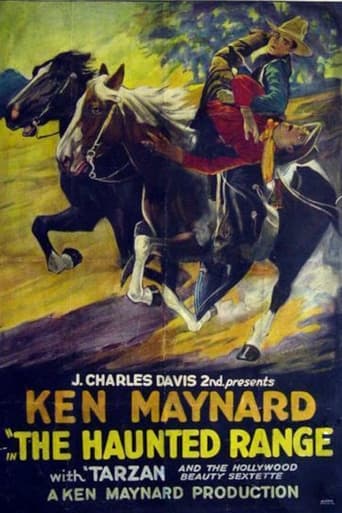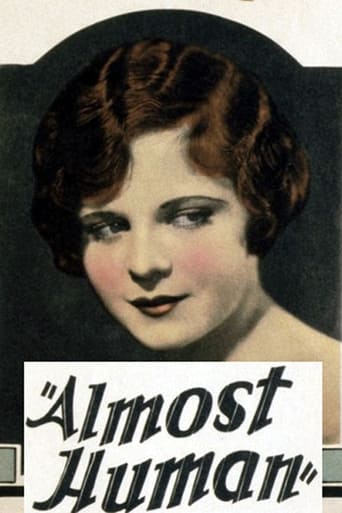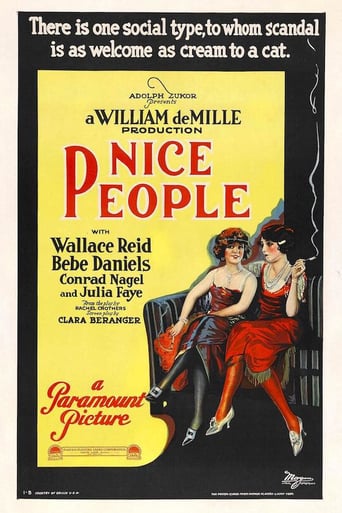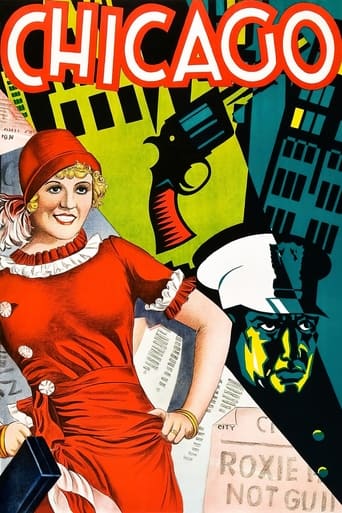
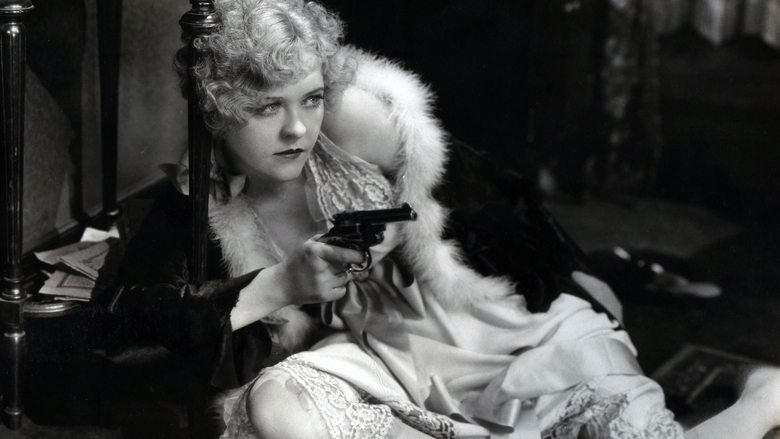
Chicago (1927)
Based on a true story, two-timing boozing wife Roxie Hart kills her lover in cold blood after he leaves her, and finagles her way out being indicted. The basis for Kander/Ebb's 1975 Broadway musical of the same name and its Oscar-winning 2002 film adaptation.
Watch Trailer
Cast
Similar titles
Reviews
This is a coming of age storyline that you've seen in one form or another for decades. It takes a truly unique voice to make yet another one worth watching.
Blistering performances.
It's easily one of the freshest, sharpest and most enjoyable films of this year.
The movie turns out to be a little better than the average. Starting from a romantic formula often seen in the cinema, it ends in the most predictable (and somewhat bland) way.
CHICAGO (1927) is the story of Roxie Hart (Phyllis Haver), a bored young housewife who kills her lover during an argument. She convinces her doting husband Amos (Victor Varconi) that she killed the man in self- defense. Amos goes to great lengths to save her from the noose, hiring oily lawyer William Flynn (Robert Edeson). Meanwhile, a slick reporter (T Roy Barnes) plays up her beauty and "innocence", making her into a nationwide celebrity. Direction is credited to Frank Urson, but in actuality Cecil B DeMille directed the majority of the film.CHICAGO is an adaptation of a play by author Maurine Watkins, which was inspired by Watkins' own articles about the trial of real-life murderess Beulah Annan. The film is tight and well crafted. In particular, it's a sharp and merciless satire on unearned celebrity, societal double standards, and the hedonistic 1920s lifestyle. There are many laugh-out- loud hilarious scenes, including a scene where Flynn coaches Roxie on how to appear during his closing statement to the jury, and a scene of the photographer posing Roxie shortly after the murder takes place. Many scenes use exaggeration to make points about media sensationalism and lawyers' appeals to emotion, rather than truth, in order to exonerate their guilty clients. The humor is balanced by the dramatic portrayal of Amos' efforts to save his undeserving wife from the noose. Amos is the moral center of the movie, a decent man who is so in love with his wife that he is willing to break the law to save her, yet struggles with her murderous deed and self-centered, callous attitude.The acting in CHICAGO is nothing less than excellent. Phyllis Haver makes a great lead, portraying the many facets of Roxie Hart's character skillfully. She shows equal comedic and dramatic ability. One could argue that Roxie is a sociopath, able to turn on the charm and the waterworks at will in order to get her way, but fundamentally lacking a conscience. Haver's portrayal of Roxie is perfect. I had never heard of Victor Varconi before, but he played Amos with great skill, sensitivity and restraint, turning in a very believable performance. The rest of the cast does fine work as well.Visually, CHICAGO is top-notch, with skillful editing, fluid camera work, and meaningful use of visual cues. One instance of this is a shot of a crowd walking heedlessly on a newspaper with Roxie on the front page once her 15 minutes of fame are up. The visual style of the film points the way forward to the classic Hollywood style of the 1930s and 40s. This film came out the same year as landmark movies like SUNRISE, WINGS, and METROPOLIS, and even though it is not as celebrated as those visual marvels, in its way it's just as accomplished.SUMMARY: CHICAGO is a skillful blend of satire and drama that boasts a razor-sharp script, excellent performances, and highly accomplished direction. The message of the movie has just as much resonance now as it did in its time. A classic! SCORE: 10/10.
Chicago in the mid 20's of the last century. In this modern Amerikan city reside the Hart's, a young married couple, who adapt to the spirit of the big city. Herr Amos Hart works in a tobacco store and Frau Roxie Hart does absolute nothing but to be unfaithful to her husband with an old man. The old-timer accommodates her whims although this is coming nearly to an end. So when Frau Roxie hears this news; she, who is a bad, bad girl ( besides a peroxide blonde with no brains ... excuse this Herr Graf for such obvious remark ) kills her lover in her apartment.Desperate over what she has done, she calls for help to her husband telling him that the old man tried to get advantage of her. Herr Hart who is a good man but not stupid at all, discovers what really happened in there. But his love for Roxie is so important to him that he decides to help her by taking the services of a famous, greedy and unscrupulous advocate ( excuse again this Herr Graf for such an obvious remark ); this in order to defend his wife from the death penalty. However, such favour has an expensive price – 5.000 grand that obviously Herr Hart doesn't have.During a visit to his greedy advocate, he finds out where he hides a lot of money in his bureau and during the night steals the money ( an honourable deed indeed, to rob an advocate ). Meanwhile Frau Roxie Hart's famous trial is nearly begun."Chicago", a film directed by Herr Frank Urson in the silent year of 1927, was based in a Broadway play which in turn was based on a true story ( occurring in a real city! ). Reminiscences of the original stage play in its primal concept can be seen in the film, when the director uses a few sets ( the Hart's apartment, the jail or the trial court ) in order to develop the story as it were different acts of a play. This is especially during the first part of the film during the dramatic development at the Hart's apartment and at the end of the movie during the trial. However, Herr Urson makes fairly good use of the proper characteristics of the cinema film narrative in "Chicago" by, constructing excellent visual metaphors ( the jury's feet responding Frau Roxie charms, the tabloid paper going down the gutter ). There are also important and sibylline sexual remarks that are present during the whole film (ah, that garter bell belt). And let's not forget the social realism that can be seen in the film ( Chicago daily life or the Hart's apartment ). Especially outstanding is the power of the yellow press in those old days ( and unfortunately in these modern days too ); the sensationalist journals build up stories on innocent celebrities that certainly have few merits. Naturally this happened with the madcap Roxie, a situation depicted in "Chicago" in a raw and effective way.Another merit of "Chicago" is the combination of comedy and drama in equal terms highlighting Frau Roxie's stupidity, selfishness and easy living in contrast with her self-sacrificing husband who suffers the acts and nonsense of his wife. He's a man who honestly cares about and loves his wife enough to steal and lie for her although this affection and emotion is not returned.Starring as the couple are two excellent and not well-known actors who handle their roles considerably well. Herr Victor Varconi as Herr Amos Hart is the lovingly and humiliated husband. Frau Phyllis Haver shines and takes all the credit in the picture thanks to her brilliant performance as Roxie Hart, a madcap, simple and selfish modern girl who has no scruples combined with no brains ... who will have a moment of glory as a famous killer thanks to the help of the yellow press ... who will meet her end on the end of a rope a woman who lives her own life caring for no one except the money."Chicago" is an excellent silent movie for all those reasons mentioned above by this German count. Don't forget also a modern one added recently featuring a superb musical score compiled by Herr Rodney Sauer and "The Mont Alto Motion Picture Orchestra". They capture the spirit and mood of the roaring twenties of the last century.And now, if you'll allow me, I must temporarily take my leave because this German Count must to return to the Schloss from the Windy City.Herr Graf Ferdinand Von Galitzien http://ferdinandvongalitzien.blogspot.com
Really terrific silent film about Roxie Hart (played by Phyllis Haver), blonde bombshell married to a handsome, devoted, sensitive husband who does stuff like serve her breakfast in bed - he loves "every curl on her head". Wishing she had more "gold" she is busy having an affair with Eugene Palette, but when he comes around and accuses her of running after him for his money (which is true, of course, as she says something like "what else have you got I'd want?"), he dumps her and, well, she shoots him dead. But soon Roxie is arrested and loving it as she laps up the publicity she receives as a public figure dubbed the "Jazz Slayer"; she's soon put on trial for murder under the tutelage of a high-priced defense lawyer who teaches her all the tricks to help steer the jury her way!An excellent film with intriguing plot line and funny too, there are quite a few laughs in this. There is a very amusing scene in women's prison featuring an ensemble of lady prisoners apparently allowed to wear their "street" attire in jail, not limited to sequins, garters, and black lace teddies - Roxie gets into a big cat fight with one of these ladies, featuring lots of hair pulling and both of them rolling around on the floor all tangled up in an exercise belt. The film features a truly great and memorable performance by Phyllis Haver, absolutely perfect in this part. And I must say, the actor who plays her husband, Victor Varconi, is truly a very handsome man! The screening I saw of this featured an absolutely gorgeous black and white print - I long to see this film released on DVD. Really great.
I, too, was fortunate to attend the public screening of this recently-restored film at the Academy's Samuel Goldwyn Theatre in Los Angeles. While I feel that some of the scoring choices on the part of the accompanying dance orchestra were inappropriate and distracting, and while I suspect that the projection speed was a bit slow (22 fps instead of 24), this is an excellent film adaptation (based on the original stage play) that can hold its own in comparison to the 2002 version (based on the Broadway musical). I should note, too, that this preserved print is the "roadshow" version, which means it is a longer version that was probably shown at the New York or Los Angeles premieres before being cut down for wider release in 1927.Aside from the stellar performances of Phyllis Haver (sexy, vibrant, and even affecting) and Victor Varconi (stoic and sympathetic) as Roxie and Amos Hart, what struck me most about this film was its pervasive use of dramatic irony--a device that is eminently suited to this particular story. Whereas the Bob Fosse musical seeks to emphasize the power of the media in manipulating public opinion, this 1927 CHICAGO strikes me more as a comment on the ironies of life, both cruel and merciful. To name only one example (caution: spoilers ahead), the murder scene is exquisitely conceived: as a player piano hammers out a joyful rag, Roxie rashly fires a shot as her lover walks out the door. The bullet pierces a mirror on the door and reaches its target on the other side. As Roxie looks on in horror at the dead man on the floor, the piano continues, oblivious to the tragedy that has occurred. The cracked mirror, and the black stockings on the door effectively add to the irony of the scene.This is a film that deserves a DVD release (at proper projection speed and with a top-notch score). If Phyllis Haver has been unjustly forgotten (the curse of Roxie Hart's fate), this is the film that, if marketed properly, could turn her into a bona fide 1920s icon. Talk about irony.
